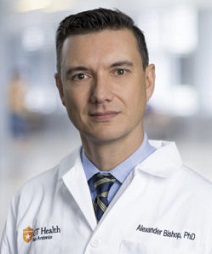Dr. Alex Bishop Receives International Grant To Study Ewing Sarcoma

Although COVID-19 has become the top health and research priority around the world, a child is still diagnosed with cancer every two minutes globally.
To meet this urgent need, the Stand Up To Cancer and Cancer Research UK’s Pediatric Cancer New Discoveries Challenge has awarded grants to three international teams to study aspects of hard-to-treat pediatric cancer.
 One of the grants will go to Alexander Bishop, DPhil, at The University of Texas Health San Antonio and Professor Kevin Hiom at the University of Dundee, Scotland, who will team up to investigate a unique biological hallmark of Ewing sarcoma, a type of cancer that affects bones and the surrounding tissue and has very limited treatment options. The focus of their study involves R-loops. R-loops are present in higher amounts in Ewing sarcoma and are caused by the same genetic alteration that drives this pediatric cancer. The team hopes to create a drug that will impact R-loop accumulation and eliminate these cancer cells.
One of the grants will go to Alexander Bishop, DPhil, at The University of Texas Health San Antonio and Professor Kevin Hiom at the University of Dundee, Scotland, who will team up to investigate a unique biological hallmark of Ewing sarcoma, a type of cancer that affects bones and the surrounding tissue and has very limited treatment options. The focus of their study involves R-loops. R-loops are present in higher amounts in Ewing sarcoma and are caused by the same genetic alteration that drives this pediatric cancer. The team hopes to create a drug that will impact R-loop accumulation and eliminate these cancer cells.
“My lab has been studying Ewing sarcoma for the past 10 years, trying to unravel the biology of this disease that had been such a mystery for decades. We want to begin to identify ways to effectively treat these cancers with less toxic consequences for these young patients. My scientific background is in DNA repair and DNA damage response. People who inherit a deficiency in repairing damage to DNA are predisposed to getting cancer, usually as children or young adults. The genes involved in these inherited diseases are often the same that are mutated in adult cancer. Our hope in studying both childhood and adult cancers is that we can learn from both diseases,” said Dr. Bishop, an associate professor of cell systems and anatomy in the Joe R. and Teresa Lozano Long School of Medicine. Dr. Bishop trained at Oxford and Harvard before joining the Greehey Children’s Cancer Research Institute in 2005.

SONY DSC
Dr. Bishop’s lab has developed several mouse models and tissue culture systems to study Ewing sarcoma, as well as specialized genomics and computational tools to identify and characterize R-loops. The Greehey Children’s Cancer Research Institute, along with the Mays Cancer Center, home to UT Health San Antonio MD Anderson, offer a unique and highly supportive environment for these types of studies.
In June, Dr. Bishop contributed to a study published in the prestigious journal, Nature, that hints of a possible target for treating Ewing Sarcoma. Preceding that in 2018, Dr. Bishop’s team led another study published in Nature showing a link between the breast cancer protein BRCA1 and Ewing sarcoma.
Around 1,900 cases of pediatric cancer are diagnosed in the UK every year, and more than 15,000 cases are diagnosed in the U.S. Efforts to defeat the COVID-19 pandemic have revealed the power of scientific collaboration on a global scale, which could greatly benefit research in other areas – such as pediatric cancer – in the long term.
“Despite the world’s focus on the COVID-19 pandemic, it remains imperative to continue supporting the research efforts and infrastructure for childhood cancers in both the near and long term,” said Sung Poblete, PhD, RN, CEO of Stand Up To Cancer. “The forward momentum of each of these teams is very promising, as they focus both on children currently in treatment as well as those that are yet to be diagnosed.”
The Stand Up To Cancer-Cancer Research UK Pediatric Cancer New Discoveries Challenge supports teams focused on understanding the drivers of pediatric cancers and the usage of novel or repurposed medicines for therapeutic purposes. The three trans-Atlantic teams will do the initial development over two years and then compete for an additional four years of funding to further advance their work.
“Progress in children and young people’s cancer remains stubbornly low for certain cancer types,” said Dr. Matt Kaiser, Head of Discovery Research at Cancer Research UK. “By funding these transatlantic collaborations, we hope to accelerate progress in our understanding of cancer in children and young people, which will ultimately lead to much needed new ways to treat these cancers in the clinic.”
To learn more about the grants awarded to the international teams of researchers, visit https://standuptocancer.org/press/three-new-trans-atlantic-research-teams-to-study-hard-to-treat-childhood-cancers/.
This article was originally published on The Newsroom.
